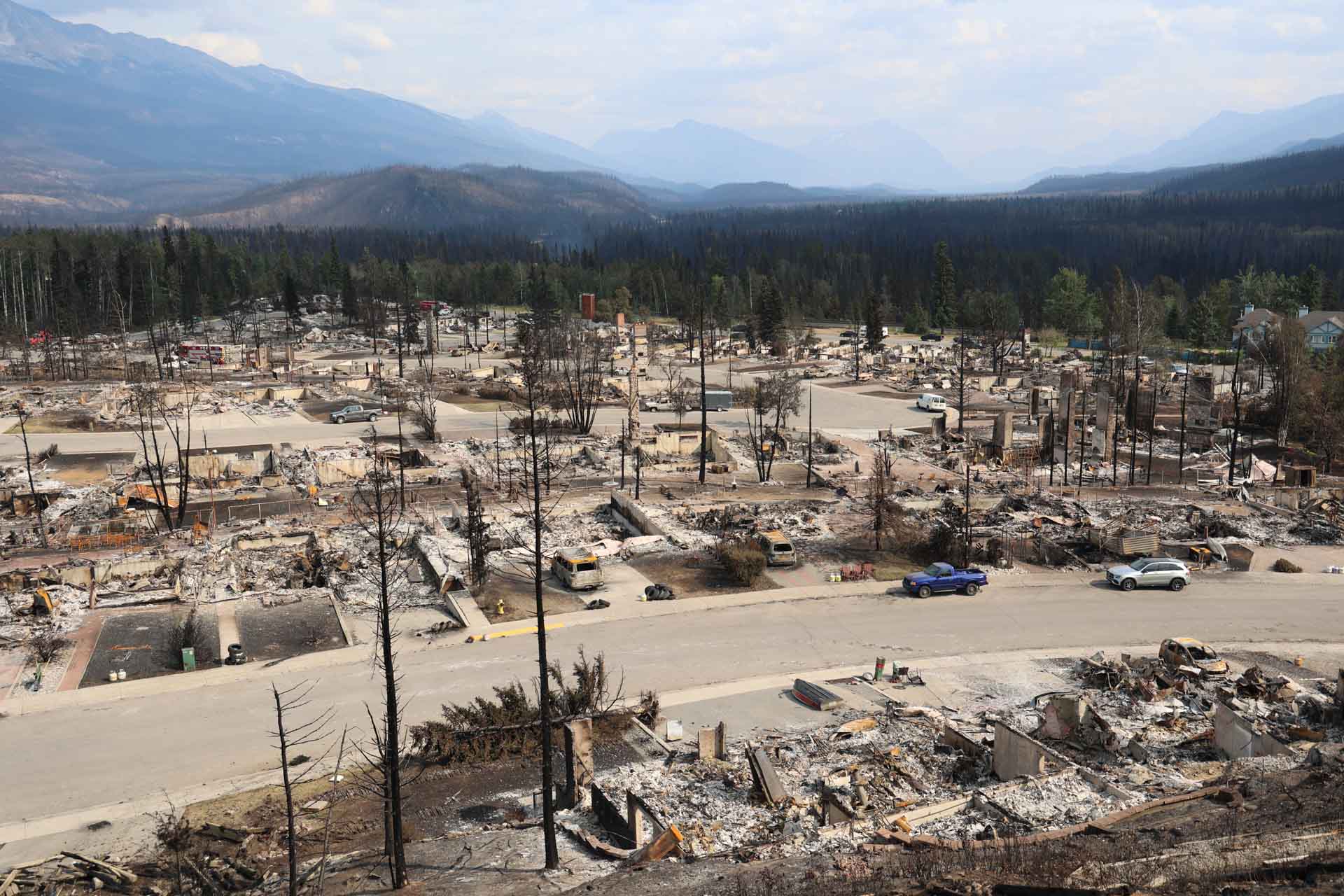Alberta
Conservatives say Federal Government cancelled ‘prescribed burn’ which may have saved Jasper

Photo from Parks Canada – Jasper Fire, Cabin Creek
From the Facebook page of Conservative MP Dan Mazier
BOMBSHELL EVIDENCE

From Red Deer MP Blaine Calkins
Trudeau’s Radical Environment Minister confirms he was briefed on the serious likelihood of a catastrophic fire in Jasper. But he cannot confirm what direction he gave to immediately clear the deadwood tinder box around Jasper. Experts warned. Liberals ignored.

Photo from Parks Canada – Jasper Fire, Geike Street
News release from the Conservative Party

Photo from Parks Canada – Jasper Fire, Geike Street Looking To Patricia Street
Over the past few years, consecutive Liberal Environment Ministers refused to listen to experts when they warned repeatedly that Jasper National Park was at “serious risk of a catastrophic fire.” But they took no action, and now one-third of Jasper has been destroyed, a firefighter lost their life, while peoples’ livelihoods have been destroyed.
This was made clear in a House of Commons’ Committee yesterday when Trudeau’s radical Environment Minister, Steven Guilbeault, said “there was no stopping this fire.” But this is nothing more than a lie. The Liberal Government has been warned for years that Jasper National Park was at risk. In 2016, Conservatives first raised the alarm that pine beetles and poor forestry management had made Jasper vulnerable to wildfires, but the Liberals ignored our warnings.

Photo from Parks Canada – Jasper fire, Maligne Lodge
Following that, two scientists in 2017-2018, tried to warn the Liberal Government about the growing threat of a wildfire. They wrote to then-Liberal Environment Minister, Catherine McKenna, saying that a century of fire suppression, combined with a warming climate and the mountain pine beetle epidemic, made the likelihood of a major fire “a matter of when, not if.” But all along they were met with condescension and denialism. On top of this, local residents even launched a pressure campaign, calling on Jasper National Park to begin taking actions to mitigate the wildfire risk, but consecutive Liberal ministers did nothing.
Now, Canadians have discovered that Parks Canada prioritized political optics over prescribed burns. In an email, a senior Parks Canada director wrote “at what point do we make the organizational decision to cancel prescribed burns in Western Canada? … Public and political perception may become more important than actual prescription windows.”

Photo from Parks Canada – Jasper fire, Turret Street looking to Miette Avenue
The catastrophic wildfire that occurred in Jasper National Park this summer has not alleviated the risk of another disaster. The threat to communities in Jasper National Park will persist unless the Liberal Government fundamentally changes its approach to forest management, but it’s clear Steven Guilbeault is in denial.
Alberta
Alberta will defend law-abiding gun owners who defend themselves

Alberta’s government will introduce a motion under the Alberta Sovereignty within a United Canada Act to defend law-abiding firearms owners.
A new motion under the Alberta Sovereignty within a United Canada Act will, if passed by the legislature, instruct all provincial entities, including law-enforcement agencies such as municipal police services and the RCMP, to decline to enforce or implement the federal gun seizure program. The motion also makes clear that Albertans have the right to use reasonable force to defend themselves, their families and their homes from intruders.
This builds on the steps Alberta has already taken to reduce crime, strengthen public safety and assert provincial jurisdiction over firearms. This includes passing the Alberta Firearms Act to establish the Alberta Chief Firearms Office, along with the Alberta Firearms Regulation and the Seizure Agent and Provider Licensing Regulation.
“It’s time for Ottawa to stop targeting the wrong people. Albertans have the right to protect their homes and their families. No one should hesitate to defend themselves when faced with a threat at their own doorway. Law-abiding citizens, hunters, farmers and sport shooters are not the source of violent crime, yet the federal government wants to confiscate their property while illegal guns pour across our borders. Alberta will not stand by while responsible gun owners are treated like criminals. This motion is about using every legal tool we have to protect their rights, uphold public safety and push back on federal overreach into provincial jurisdiction.”
“When someone breaks into your home, the law recognizes that you have enhanced rights to protect yourself and your family. Alberta is making that principle unmistakably clear: lawful, reasonable self-defence will be respected, not criminalized.”
“As an experienced former law enforcement officer, law-abiding gun owners have never been an issue, in my own personal experience, nor has there been any data to support that law-abiding gun owners are the ones that are committing violent gun crimes. The illegal guns that you see being used by criminals are typically being smuggled in from the United States. The federal government should help us strengthen the border, helping us to stop illegal guns from coming into Canada. This would further enhance safety and security for the people of Alberta and Canada as opposed to going after lawful gun owners.”
Under the Alberta Firearms Regulation, municipalities, law enforcement and police commissions must obtain approval from Alberta’s Minister of Justice before accepting funding to participate in the Assault-Style Firearms Compensation Program.
“Misguided federal initiatives such as the handgun transfer ban and the Order in Council firearms prohibitions of 2020, 2024 and 2025 have had a devastating impact on the safe, legitimate activities of the firearms community and the businesses that support it, while having no discernible effect on criminal activity. I am proud to see that the Alberta government is pushing back and supporting lawful firearms owners through these measures.”
“Licensed gun owners and all Albertans can rest assured that their government, under the leadership of the UCP, is laser focused on protecting law abiding citizens while prioritizing real public safety.”
“The Alberta Hunter Education Instructors Association will continue to support our government and the Alberta chief firearms officer in our joint quest to use safety training and education as the key tools to ensure we have safer streets and communities. Safe and responsible use of firearms in Alberta is a key part of our heritage, culture, and our rich and precious heritage.”
Key facts:
- Pursuant to the Attorney General’s recent guidance protocols, Alberta’s prosecutors will decline to prosecute offences under the federal gun seizure program when it is not in the public interest.
- The Attorney General’s recent guidance protocol directs prosecutors to not prosecute home defence offences when it is not in the public interest.
- Total spending on the federal Assault-Style Firearms Compensation Program is expected to exceed $750 million.
- The firearms motion considers the Alberta Bill of Rights, the Constitution Act, 1867 and the Criminal Code.
- Currently 10 per cent of adult Albertans are licenced to use and own firearms. There are 381,900 firearms licences in Alberta.
- Alberta has 638 licensed firearms businesses, 138 shooting ranges and 91 shooting clubs.
Alberta
Emissions Reduction Alberta offering financial boost for the next transformative drilling idea

From the Canadian Energy Centre
$35-million Alberta challenge targets next-gen drilling opportunities
‘All transformative ideas are really eligible’
Forget the old image of a straight vertical oil and gas well.
In Western Canada, engineers now steer wells for kilometres underground with remarkable precision, tapping vast energy resources from a single spot on the surface.
The sector is continually evolving as operators pursue next-generation drilling technologies that lower costs while opening new opportunities and reducing environmental impacts.
But many promising innovations never reach the market because of high development costs and limited opportunities for real-world testing, according to Emissions Reduction Alberta (ERA).
That’s why ERA is launching the Drilling Technology Challenge, which will invest up to $35 million to advance new drilling and subsurface technologies.
“The focus isn’t just on drilling, it’s about building our future economy, helping reduce emissions, creating new industries and making sure we remain a responsible leader in energy development for decades to come,” said ERA CEO Justin Riemer.
And it’s not just about oil and gas. ERA says emerging technologies can unlock new resource opportunities such as geothermal energy, deep geological CO₂ storage and critical minerals extraction.
“Alberta’s wealth comes from our natural resources, most of which are extracted through drilling and other subsurface technologies,” said Gurpreet Lail, CEO of Enserva, which represents energy service companies.
ERA funding for the challenge will range from $250,000 to $8 million per project.
Eligible technologies include advanced drilling systems, downhole tools and sensors; AI-enabled automation and optimization; low-impact rigs and fluids; geothermal and critical mineral drilling applications; and supporting infrastructure like mobile labs and simulation platforms.
“All transformative ideas are really eligible for this call,” Riemer said, noting that AI-based technologies are likely to play a growing role.
“I think what we’re seeing is that the wells of the future are going to be guided by smart sensors and real-time data. You’re going to have a lot of AI-driven controls that help operators make instant decisions and avoid problems.”
Applications for the Drilling Technology Challenge close January 29, 2026.
-

 National1 day ago
National1 day agoMedia bound to pay the price for selling their freedom to (selectively) offend
-

 Business1 day ago
Business1 day agoIs there a cure for Alzheimer’s Disease?
-

 Bruce Dowbiggin1 day ago
Bruce Dowbiggin1 day agoSometimes An Ingrate Nation Pt. 2: The Great One Makes His Choice
-

 Alberta1 day ago
Alberta1 day agoNew era of police accountability
-

 Energy2 days ago
Energy2 days agoCanadians will soon be versed in massive West Coast LPG mega-project
-

 C2C Journal1 day ago
C2C Journal1 day agoLearning the Truth about “Children’s Graves” and Residential Schools is More Important than Ever
-

 Artificial Intelligence2 days ago
Artificial Intelligence2 days ago‘Trouble in Toyland’ report sounds alarm on AI toys
-

 Brownstone Institute1 day ago
Brownstone Institute1 day agoThe Unmasking of Vaccine Science






